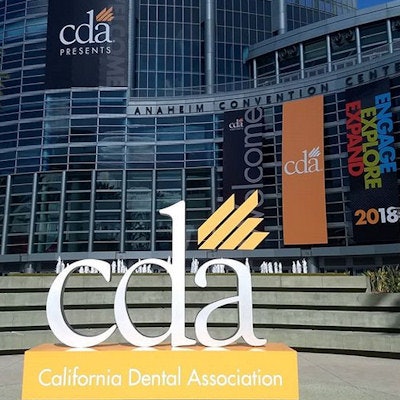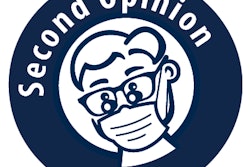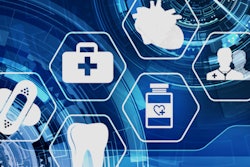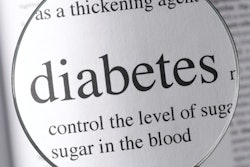
Dennis Abbott, DDS, lives in the future. It's not unusual for the general dentist to review blood work, salivary DNA analysis, and bacterial profiles before recommending patient treatment. He regularly talks with physicians, nurses, and psychologists, ensuring the whole medical team is on the same page for each patient's care.
Perhaps most importantly, he has a seat at the decision-making table. His colleagues on the medical side of the healthcare divide respect him as a voice of authority, a "teeth god." He's leaned into this role and claimed oral health's place within the larger medical community.
 Dennis Abbott, DDS.
Dennis Abbott, DDS."I cannot do what a physician or radiation oncologist does," Dr. Abbott told DrBicuspid.com. "I'm not trained for that, and it's not in the scope of my practice. But they can't do what I do. I'm just as needed at the table as they are."
Dr. Abbott calls this model personalized healthcare, a way to individualize patient care that is comprehensive and collaborative across medical specialties. He spoke about the topic at the recent California Dental Association's CDA Presents meeting in Anaheim, CA, and he hopes one day the rest of dentistry will catch up with him and his team. For the moment, personalized medicine within dentistry is a niche.
Dr. Abbott didn't intend to practice this way. But when he set out to treat patients with cancer, he quickly learned he needed an innovative approach.
Cancer treatment requires whole-body care
Cancer is nondiscriminating. It doesn't care if it's inconvenient for someone with tumors in their colon to have side effects that affect the mouth, brain, and heart. It forces doctors who would otherwise be happy in their siloed professions to communicate, acknowledging just how interconnected bodily systems are. Too often, dentists are left out of the conversation.
Dr. Abbott's journey into this type of work started with just one patient with cancer. Then one every week or two. Now, patients with cancer make up the bulk of Dr. Abbott's Texas-based practice.
There was a learning curve. Every medical specialty has its own lingo, and by now, Dr. Abbott says he's fluent in "oncolog-eze." To get to this point, he spent years Googling medical terms and test names, as well as reading all the relevant medical literature he could get his hands on.
He liked the challenge of learning something new, but even more so, he liked knowing he was making a real difference in the lives of his patients. He has convinced medical providers to refer patients to him before they begin radiation, chemotherapy, surgery, and other cancer treatments. As a result, he's able to prevent or mitigate oral health-related side effects.
For patients with cancer, having a diverse care team that's on the same page can lead to huge strides in overall quality of life. But personalized medicine can stretch beyond cancer care, Dr. Abbott said. It's something that dentistry should embrace for the good of all patients.
How dentists fit into personalized healthcare
Personalized healthcare simply means looking at the patient in the dental chair as a whole person, rather than just a set of teeth and gums. It often includes using data to drive decision-making and acknowledging that oral health treatment can have far-reaching systemic effects.
In the past five years, researchers have made huge strides in proving correlation, and even causation, between oral bacteria and systemic diseases. New research has found oral bacteria may cause coronary artery disease. Links also have been discovered between oral health and Alzheimer's disease, diabetes, and some types of cancer.
"When I was trying to put this concept of a practice together, I sat my team down and said, 'We have to step beyond the four walls of our office, and we have to see ourselves in this bigger picture,' " Dr. Abbott said. "And we did. It's worked for us."
In his practice, Dr. Abbott runs salivary DNA diagnostics, asks for blood work from physicians, and runs biological and fungal profiles. He uses these and other data points to get a comprehensive patient picture and prescribe treatment accordingly.
“Each and every day, I see patients who have lost some element of their oral health. They would give anything to get it back.”
For instance, he uses bacteria profiles to get a sense of what types of periodontal pathogens his patients have. This helps him determine whether systemic antibiotic treatment is necessary and, if so, which type of antibiotic would be most effective. Bacterial profiles are easy and inexpensive, making them an ideal tool for most practices to use.
"You get into really personalizing the medicament choices you're making for patient's treatment," he said. "And you're not having to go through trial and error of putting the patient on three rounds of three separate antibiotics to find one that is going to work when you could have looked at some kind of a profile from the get-go, saw what you're dealing with, and went directly to the most effective."
Yes, Dr. Abbott realizes not every dentist is going to take the extensive measures he has, but he also believes dentists who don't start to gather data and get a more holistic patient picture will get left behind.
"There's going to be more of a focus on prevention and services that go beyond fillings and restorative procedures," he said. "Of course, those elements are paramount in what we do as dentists. But there is going to be more of an integration of technology and clinical testing to get quantitative numbers."
Moving toward a personalized future
The leap to comprehensive, collaborative healthcare will be tough, Dr. Abbott acknowledged. Dental schools will have to include relevant training, and dentists will need to work closely with their medical colleagues. Insurance and public policy will also need to break down barriers between dentistry and medicine.
"Even though we're beginning to make strides, there is this wall between services, training, and insurance," he said. "At some point, that's going to have to change. It is going to be hard to sell until there's some recognition of the importance of oral health as systematically impactful."
Although he doesn't know the way forward, Dr. Abbott is convinced the divide between dentistry and medicine is artificial. Through his patients, he's learned just how valuable oral health is to physical and mental well-being. He's witnessed the quality of life spiral that occurs when a patient's oral health deteriorates, and he's proud that dentists are the front lines of treating this important healthcare need.
"Think about all we do with our mouths," he said. "We eat, we drink, we speak, we smile, we socialize with friends, we kiss our loved ones. Why shouldn't it be important? Each and every day, I see patients who have lost some element of their oral health. They would give anything to get it back."



















